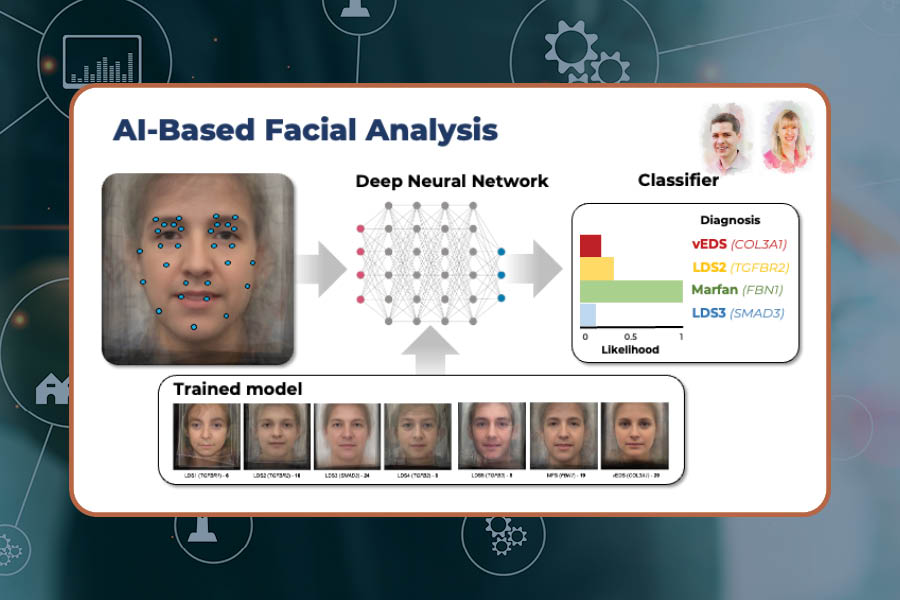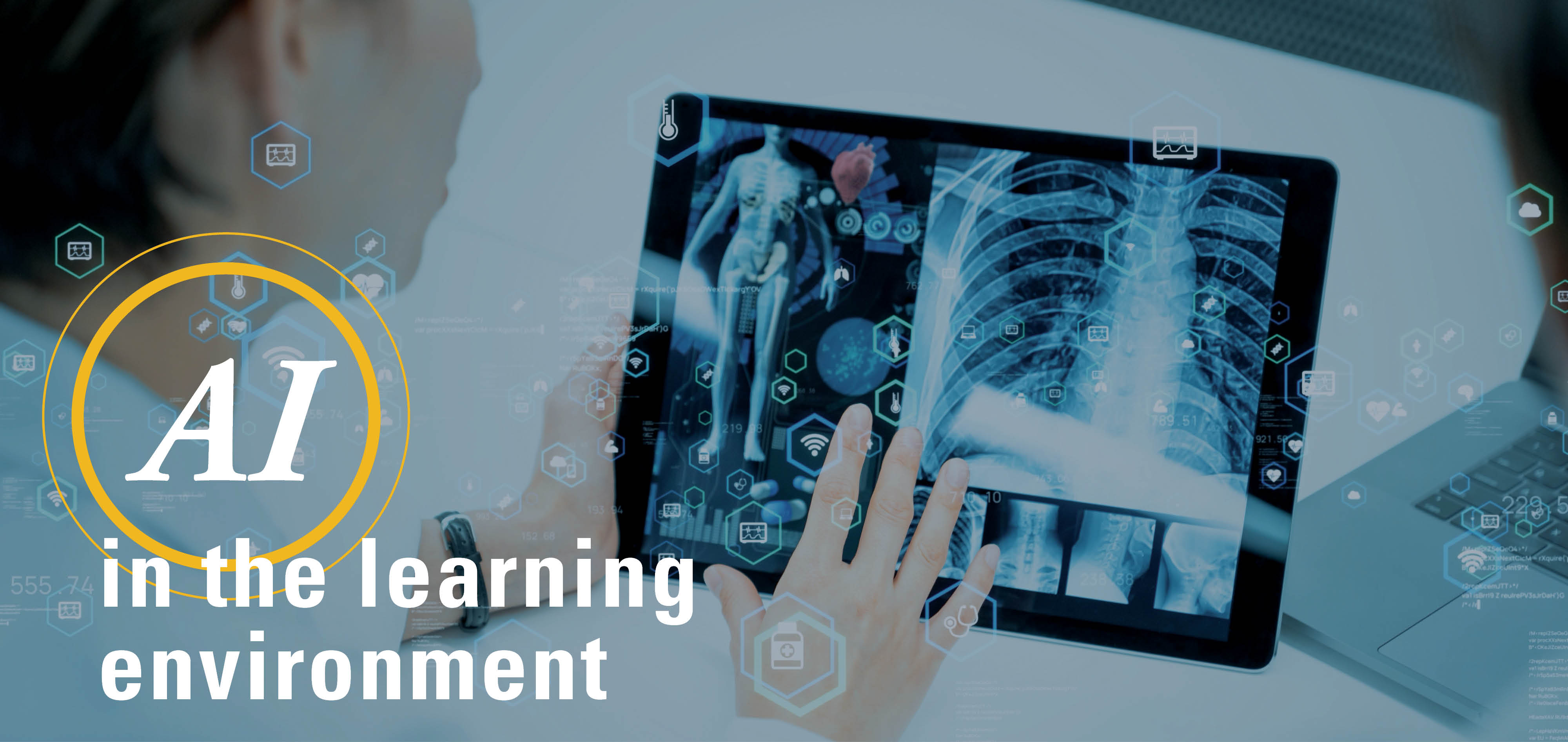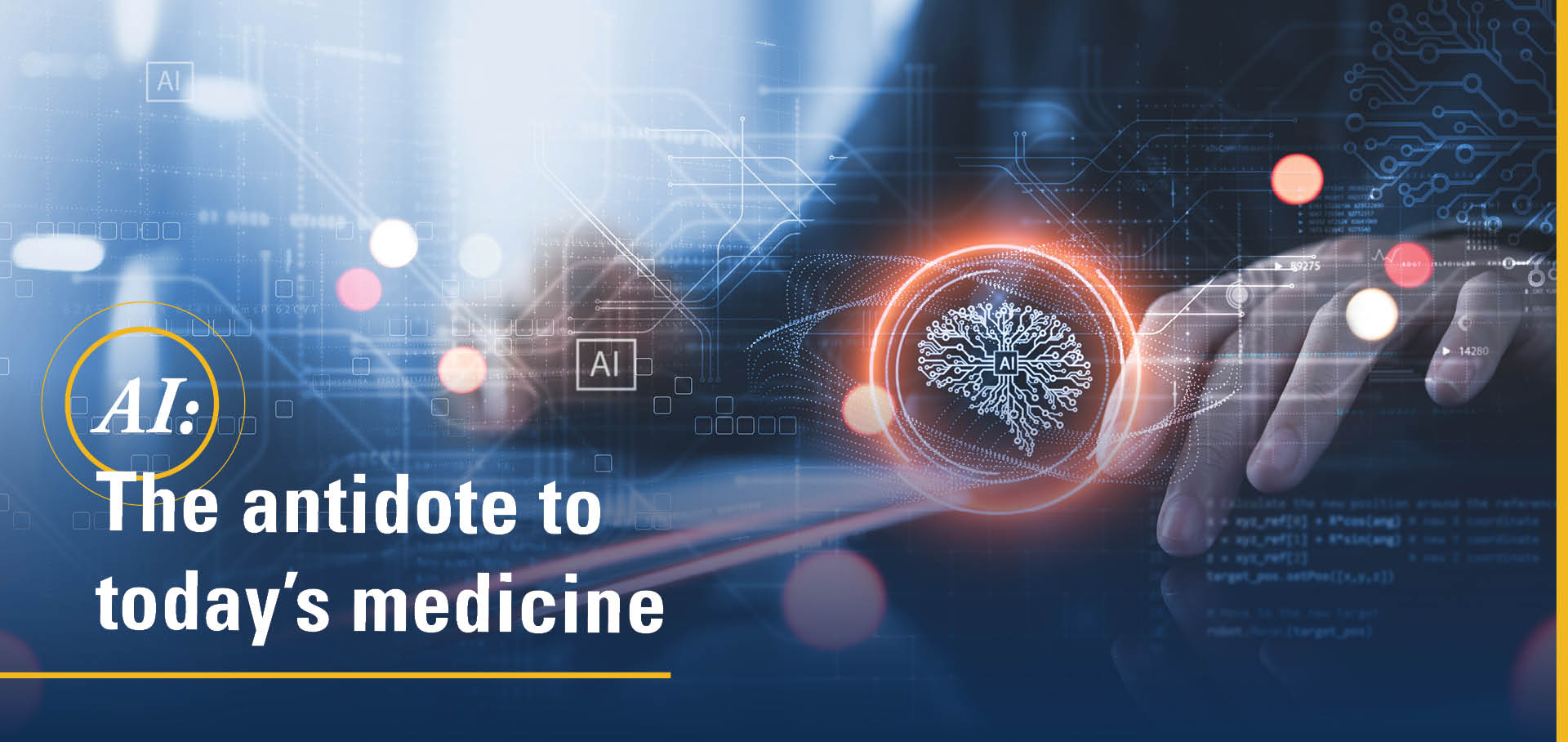Could the proliferation of AI in medicine bring us back to a simpler time, when the doctor-patient relationship was paramount?
“When I was growing up, we had a family physician who was an excellent doctor. He knew all our history because he treated us from as far back as I can remember until I was a teenager. Without using computers, just paper charts, he spent time conversing with us about school and various activities, memorizing everything,” recalled Toufeeq Syed, PhD, associate professor at McWilliams School of Biomedical Informatics and McGovern Medical School.
Today’s physicians face an ever-increasing overload of information, with compressed time for patient-interaction.
“With the scaling of our health care system, it is now impractical for practitioners to retain all this information,” Syed said. “AI can analyze extensive data, including decades of medical records, to identify trends and predict risks, advising on necessary actions by assessing macro trends.”
Improving the doctor-patient relationship, patient outcomes, and physician burnout are all goals of AI in medicine.
The virtual elephant In the room
AI advocates see technology as a physician’s help rather than hindrance. Overworked and burned-out physicians at McGovern Medical School are embracing new technology to automate tasks and free up valuable patient time.
“AI, much like many other tools, serves best as an assistant to manage tasks,” said Babatope Fatuyi, MD, chief medical information officer, UTHealth Houston. “It helps us manage the workload without losing that critical human touch.”
Technology is often a barrier in patient-care settings, as doctors turn to the computer instead of the patient. Novel features within the electronic health record seek to remedy that dynamic.
A few years ago, UTHealth Houston invested in Epic as its electronic health record for its UT Physicians clinical practice. “Epic presents a significant advancement across our clinical, operation, and patient experience domains,” Fatuyi said.
Epic has integrated AI into many of its functions and workflows, with more being added and customized for UT Physicians.
“Clinicians also have the ability in Epic to ask questions in everyday language that generate immediate data responses to improve patient care,” Fatuyi added. “It’s like magic.”
AI also can improve the response time of patient inquiries – generating patient- friendly billing summaries to minimize customer service inquiries, answering nonclinical questions, and offering conversational scheduling to handle follow-up appointments, all improving the patient experience.
In the Epic health portal, patients can message their physician offices, and AI can analyze the data for a draft response. But, this does not mean that AI is responding, or involved in health care decision-making.
“It’s crucial that health care staff remain in control of what gets sent out—whether AI-generated or not,” Fatuyi said. “Patients will likely appreciate that their doctors are still validating or endorsing the messages they receive, even if AI plays a role in drafting them.”
McWilliams plus McGovern
Instrumental to the adoption and growth of AI at McGovern is UTHealth Houston sister school the McWilliams School of Biomedical Informatics.
“McWilliams is a force – and Dr. Jiang’s team has done a remarkable job for the industry – we are blessed to have him in our community,” Fatuyi said.
Xiaoqian Jiang, PhD, associate vice president for Medical AI Chair at McWilliams, leads the Center for Secure Artificial Intelligence for Healthcare at UTHealth Houston, which focuses on leveraging advanced AI and machine learning technologies to enhance health care outcomes.
“My goal is to make health care more predictive, personalized, and precise,” Jiang said.
Capitalizing on McWilliams’ expertise is key to producing technology to help patients and physicians.
“As an academic health center, it’s part of our mission to explore and responsibly implement cutting-edge technologies that advance healthcare,” said Amar Yousif, MBA, vice president and chief information officer of UTHealth Houston. “By combining the expertise of McGovern Medical School, the McWilliams School of Biomedical Informatics, the School of Public Health, and our administrative teams, along with strategic collaborations with industry leaders like Microsoft, AWS, and OpenAI, we are uniquely positioned to make significant contributions in health care AI.”
Jiang and his McWilliams colleagues are building a myriad of clinical AI tools – from predicting no-show rates to real-time language translation.
“Through no-show forecasting, AI will save our patients and doctors time by predicting who will show based on historical patterns, weather forecasts, holidays, and many other factors,” Fatuyi said.
McWilliams’ language translation tool is customized for clinical specialties. “Imagine in a patient interaction, I click on the button on my phone and speak English. My words are then read out in German (or whatever language the patient speaks) in less than two seconds. If the family responds in German excitedly, it translates it back to me in English,” Fatuyi explained.
Jiang is also working on technology allowing physicians to record patient interactions to draft clinical notes, reducing time-consuming documentation.
“The potential benefits of this are immense, not only for individuals but also for society at large, in terms of health outcomes and cost savings,” Jiang said.
UTHealth Houston is responsibly leaning into AI as technology advances to make medical diagnostics without human oversight.
“To ensure that safety, privacy, and compliance remain at the forefront of every AI innovation, we have established a university-wide AI Advisory Committee and are facilitating access to advanced commercial AI tools for our researchers, faculty, and staff,” Yousif said. “While Silicon Valley continues to be a hub of innovation, we believe the next technological revolution in health care will unfold right here at the Texas Medical Center.”

The AI will see you now
Beyond using AI to make sense of big data, a researcher in the Department of Internal Medicine is training AI to make clinical diagnosis based on facial analysis.
David R. Murdock, MD, assistant professor of medical genetics, is harnessing the power of AI to aid in the diagnosis of inheritable thoracic aortic diseases, such as Marfan syndrome, Loeys-Dietz syndrome, and Vascular Ehlers-Danlos syndrome.
These rare conditions predispose patients to developing aortic aneurysms and dissections.
“It’s very important to have an early diagnosis of these types of conditions because now our management of these patients has improved significantly even over the last 15 to 20 years,” Murdock said.
Employing numerous facial images of these patients, Murdock has trained an AI model to recognize the facial characteristics of these conditions to determine those at risk in the general population.
Murdock said his goal is to be able to create a free mobile app that can identify patients early in a variety of clinical settings.
“This will allow us to continue to improve the overall outcomes of these patients and let them live longer and better lives,” he said.


AI in the learning environment
It is said that AI will not replace doctors, but that those who embrace it will gain a clear advantage. To ensure McGovern Medical School graduates are prepared for this future, AI is being introduced as part of the standard curriculum.
Starting with the fall semester of 2024, first-year students are learning the basics of AI in the context of medicine and biomedical research in the Doctoring I and Doctoring II courses. As a longitudinal theme, AI will be integrated within all four years of the medical degree curriculum.
Today’s medical school education requires AI education, said Keisha Ray, PhD, John P McGovern MD Professor of Oslerian Medicine and lead for the curriculum’s longitudinal themes.
“We want to make sure our students come out of medical school competitive with other medical school graduates, and we can’t accomplish this goal if we don’t talk about AI,” she said. “We have to make sure that our students are aware of this new technology and how they can use it to be better caregivers.”
McGovern students will learn how to navigate AI as a physician for clinical decisions, personalized medicine, and predictive analytics.
“Case studies with physicians using AI will help them understand how to use this new partner in the clinical setting,” Ray said.
The Doctoring II course will focus on specific AI applications in health care, emphasizing quality data, bias mitigation, and ethical implications.
“The ethical, legal, and social implications of AI are very important, and we have mapped those concepts onto the learning objectives for the entire university,” she added.
Prior to this fall, AI was introduced during the Medical School’s pre-entry program through a “Generative AI Critique Assignment,” where students were tasked with getting answers to multiple patient scenarios from ChatGPT and CoPilot.
The students were not convinced that AI would replace doctors, noted Litao Wang, MEd, EdD, assistant professor of Educational Programs.
“I appreciated how AI was able to generate multiple different possible diagnoses as well as management plans and testing methodologies,” said one student following the assignment. “However, the systems lacked detail in specific measurements for testing or treatment types. Both ChatGPT as well as CoPilot lacked the specificity needed in order to use this as a true method of treating a patient.”
McGovern faculty also have been introduced to AI and its use in instructional design and learning materials.
AI is not a new concept for Toufeeq Syed, PhD, associate professor at both McWilliams School of Biomedical Informatics and McGovern Medical School and assistant dean of education informatics, whose research has focused on AI educational applications for the last dozen years.
“AI is just beginning – like when the internet first started in the late 1990s,” he explained. “Back then, we didn’t think of how many ways we’re using the internet today. I think in 5 to 10 years, AI will be just as integrated in our lives as the internet is today.”
Syed aims to harness AI to create personalized education experience for all learners.
“We know what our incoming students and residents have learned so far, and we have all of the documents and data in the curriculum – the key is to build AI systems to help learners learn better and identify the gaps faster, creating a personalized experience,” he said.
Future doctors must also be equipped to evaluate AI outcomes – not just use the technology. “If it’s not working as intended, they need to learn to evaluate an algorithm in the same way that they would a device or medicine,” he said.
AI has been used in the McGovern curriculum prior to the introduction of the longitudinal theme. The Office of Educational Programs has used plagiarism detection software for years, which is newly equipped with an AI checker.
“As educators, I believe we should focus on nurturing responsible and authentic writers rather than simply catching students misusing AI tools,” Wang said.
Watch video to learn more:
